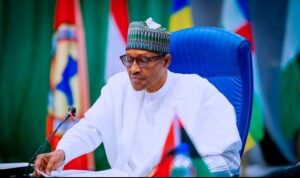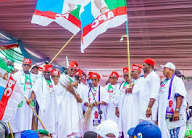For Buhari on Leadership and Enrichment, it is Easy Come Easy Go
 Former Nigerian President Muhammadu Buhari has often emphasized that he left office with the same physical assets he possessed before assuming the presidency.
Former Nigerian President Muhammadu Buhari has often emphasized that he left office with the same physical assets he possessed before assuming the presidency.
This assertion highlights his efforts to promote transparency, positioning himself as a leader who remained free from the temptations of wealth accumulation during his time in office.
Buhari’s message is clear: he did not enrich himself while serving as the country’s leader. His approach to leadership emphasized integrity and accountability, which contrasted sharply with the widespread corruption that has characterized many of his predecessors.
Upon assuming office in 2015, Buhari made a public commitment to transparency by declaring his assets. His declaration was notable for its modesty and simplicity. He listed five homes, including two mud houses in his hometown of Daura, a number of farms and an orchard, and a ranch with cattle, sheep, and horses. He also owned shares in a few companies, two undeveloped plots of land, and held around $150,000 in his personal bank account.
This relatively modest list of assets sent a strong message to the Nigerian people. It was a stark contrast to the often lavish lifestyles of previous leaders. Buhari’s asset declaration was an early indication of his determination to set a different example, especially in a country where corruption was widely perceived as rampant.
At the end of his second term in 2023, Buhari once again declared his assets to the Code of Conduct Bureau (CCB). His spokesperson, Garba Shehu, confirmed that there were no significant changes in Buhari’s asset profile. His personal bank accounts remained unchanged, and there was a slight decrease in the number of animals on his farm due to gifts he had received over the years. Despite being in office for eight years, Buhari’s lifestyle remained modest, and he had not accumulated additional wealth.
This consistency in asset declarations reinforced Buhari’s message of living a life untainted by personal financial gain. His continued commitment to transparency was also reflected in his anti-corruption policies, although these efforts were not without their criticisms. Some argued that the administration’s anti-corruption stance was sometimes inconsistent, and not all cases were fully pursued, leaving room for debate about the extent of Buhari’s success in this area.
After leaving office, Buhari maintained that his lifestyle remained modest. In January 2025, he revealed that he now relied on the rental income from one of his houses in Kaduna to meet his personal needs. The former president stated that he did not have any other major sources of income, further emphasizing his claim that he did not amass wealth while in office.
“I rely on the rent from my house in Kaduna for my sustenance,” Buhari remarked, reinforcing his narrative that public office should not be an avenue for personal financial enrichment.
This continued simplicity post-presidency has been an integral part of Buhari’s public image. Unlike many previous African leaders who have enjoyed luxurious lifestyles after leaving office, Buhari’s insistence on living within his means has resonated with many who view his approach as refreshing and different.
Buhari’s asset declarations and his insistence on transparency serve as a defining aspect of his legacy. His claims of financial integrity have made him a somewhat unique figure in Nigerian politics, where corruption is often seen as a pervasive issue. Although some critics argue that his administration did not do enough to tackle corruption at all levels of government, Buhari’s commitment to personal financial transparency sets him apart from many other leaders in Africa.
Throughout his presidency, Buhari consistently aimed to portray an image of simplicity and ethical leadership. His asset declarations, both at the beginning and end of his presidency, were an extension of this narrative. Despite the complexities of governance and the challenges of fighting corruption in a system often entrenched in bribery and dishonesty, Buhari sought to lead by example.
Whether his anti-corruption efforts fully succeeded remains a matter of debate, but his personal commitment to transparency and ethical conduct during his presidency will likely continue to be a touchstone for future Nigerian leaders. In an environment where public service is often tainted by the lure of wealth, Buhari’s example of modesty and financial transparency stands as a stark reminder of the potential for public office to be about service rather than self-enrichment.







